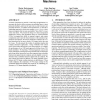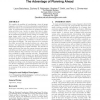48 search results - page 9 / 10 » A Game-Theoretic Approach for Designing Mixed Mutation Strat... |
108
click to vote
DSN
2008
IEEE
15 years 8 months ago
2008
IEEE
Quorums are a basic construct in solving many fundamental distributed computing problems. One of the known ways of making quorums scalable and efficient is by weakening their int...
APSEC
2006
IEEE
15 years 7 months ago
2006
IEEE
We hypothesize that certain program complexities and difficulties to realize reuse potentials have their roots in weak mechanisms for generic design of today’s programming techn...
132
click to vote
CCS
2009
ACM
15 years 8 months ago
2009
ACM
In mobile networks, authentication is a required primitive of the majority of security protocols. However, an adversary can track the location of mobile nodes by monitoring pseudo...
120
Voted
HPDC
2008
IEEE
15 years 8 months ago
2008
IEEE
As cluster computers are used for a wider range of applications, we encounter the need to deliver resources at particular times, to meet particular deadlines, and/or at the same t...
117
click to vote
ATAL
2010
Springer
15 years 2 months ago
2010
Springer
We consider the problem of coordinating a team of agents engaged in executing a set of inter-dependent, geographically dispersed tasks in an oversubscribed and uncertain environme...


